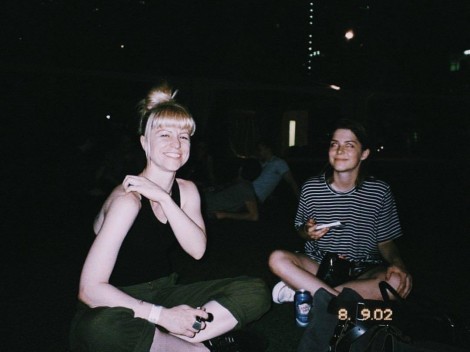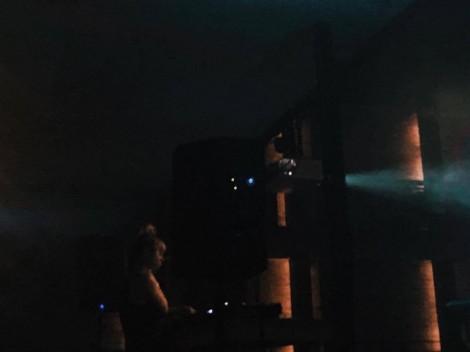[dropcap]T[/dropcap]echno’s traditions are “steeped in black protest and the plight of Detroit.” Techno’s inclusion in tradition and political sentiments allowed it to emerge from Detroit as a “post-soul” sound. In its inception, techno was a futurist form of art that was a byproduct of the African-American struggle and found itself rooted in a spiritual sensibility. This stands in stark contrast to the fetishized, European “smiley-face” phenomenon it has transformed into today. The genre was conceived to counteract the oppression of capitalist society but recently has become associated with commercial rave culture and excessive hedonism that has caused many to overlook the genre’s traditional sentiments.
From Toronto’s musical landscape comes It’s Not U It’s Me. Founded by Brian Wong and Cindy Li, the pair saw “first hand as an artist how skewed the economic landscape is here for those working in niche music.” Distancing themselves from everything they opposed in dance culture, the organization aims to “open conversation around how we can all grow together” and “try and set the stage for that to amplify, maybe re-contextualize those energies for today’s climate.” The artists they have featured have demonstrated “the right blend of dedication to craft, boundary-pushing attitude and DIY spirit.” To date, no artist has declined the opportunity to appear at one of the events.
Among these artists is Ariana Paoletti. She was invited to take part in the opening night of a summer series at the Powerplant Contemporary Art Gallery. Alongside Detroit kingpins Claude Young and DJ Stingray, Paoletti commanded the energy and attention of the audience. Known primarily by her stage name Volvox, she is an established mainstay within the underground sphere. She has 10 years of experience to vouch for the positive and nurturing environment that techno can offer. Volvox grew up in Buffalo, New York, and moved to Boston to attend college in 2003. Today she is a selector on the Discwoman roster. Her diverse and fluid setlists demonstrates her dedication to her intricate curation and has contributed to her longevity as a techno DJ in the modern music industry. The overwhelmingly positive reception resulted in an extended set and crowned her the centrepiece of the night’s many impressive headliners.
It’s Not U It’s Me is continuously striving to craft an inclusive, safe space that embodies the musical heritage that techno was founded upon. According to Paoletti, “techno and electronic music is by the disenfranchised person for the disenfranchised person, and for the outsider, and always has been. I love techno because it has that message. There’s hardly anything else in the world that has that message, that you can be a part of, and be like, ‘Hey if you care about this and you care about people and you love dancing, you can be here.’ We have this history of tying spirituality to music and community and equality. That’s the most important thing in the world to me.”
Diverse booking policies provide a means of cultivating inclusivity on the dance floor. The lack of inclusivity in electronic music today affects both patrons and producers. Cindy Li, It’s Not U It’s Me’s co-founder, believes that this behaviour costs patrons more than might be immediately visible. As electronic music grew in popularity, there was a subsequent influx of straight, white male consumers that began to dominate club spaces. “Clubs who only book white males, whose patrons are mostly white males, are bound to create an audience that’s not inclusive. Those audiences also breed a lot of toxic masculinity; especially in the presence of alcohol and drugs, many of these men become predatory.”
[pullquote-default]It’s important [that] the nightclub remains a safe space for marginalized people like women, POC and LGBTQ people. This is how we show respect to the foundation of dance music.”[/pullquote-default]
These were spaces that were traditionally occupied by black, Latino, and queer bodies. With the club’s ecology disturbed, patterns in attendance began to shift, drastically affecting the visible majority of club-goers. Li adds that, “While it would be counterproductive to exclude white straight males from dance music culture entirely, it is, however, imperative that those who want to participate have an understanding of where this music comes from and why it’s important [that] the nightclub remains a safe space for marginalized people like women, POC and LGBTQ people. This is how we show respect to the foundation of dance music.”
It’s for that reason that gender representation has become a well-documented problem in the electronic music industry. According to Li, “Within our heteronormative society, men are pushed from an early age towards developing technical skills and technical knowledge, which are highly valued in music production. What results is a music industry that has long been led by and filled with men, but it is changing. It doesn’t surprise me that male gatekeepers in industries like electronic music are putting up a stink as more women express an interest in their fields, even though many of the original pioneers of electronic music were women.”
There are steps being taken by leaders in the underground community to prevent behaviours that breed exclusion or marginalize patrons. “Female-only collectives have a massive impact in elevating female voices. Without collectives like Discwoman and Apeiron crew and figures like the Black Madonna, I’m not sure if the issue would have become as big as it has today,” said Li. Boiler Room recently announced that they will be hiring staff to moderate its “deeply misogynistic” chat room. Li, as an event coordinator, promoter, and artist, adds that “you can tailor your audience by calling out discriminatory behaviour, kicking out predators from your events, putting out a safer spaces policy. All of these things will inevitably draw a diverse audience to you.”
The rave environment is one that passionately boasts inclusivity. It invites all genders and individuals to take part and welcomes any sort of experience the rave goer wants. Paoletti notes, “putting that energy out there, connecting with the audience, and that energy transfer — that to me is real religion.” She explains that, “there’s really nothing more communal than a dark dance floor. You don’t know who’s next to you, and you don’t care. You’re there to be you, they’re there to be them, and you’re there to do the same thing, which is have a great time.”
This is why why techno often draws parallels to a new form of religion in itself. “A lot of people describe going to places like Berghain like going to church. And there’s a lot behind that. All the original Chicago house guys, and even the Detroit techno guys as well, they infuse their spirituality in this music. It’s tied to religion and spiritually at a very deep core place, but got rid of all the trappings and all the social control that kind of gets piled on top of that.”
The inclusion inherent in techno creates a faith that enthusiasts associate with rave culture. In Paoletti’s experience “dance music is about escape, and there is a strong hedonistic element of that. I don’t think you could ever expect everyone to kind of get it the whole way. There [are] plenty of people who just want to have fun, or who just love drugs, and unfortunately those people are part of the mix. I think it’s important — just like ancient religions who also utilize drugs to reach a higher plane — it comes down to every person to find a balance that works for them.”




